Okay, let’s get this out of the way: Bioshock: Infinite is the worst game of the series.
Now, I came into the franchise rather late. I didn’t have a suitable game console for a long time, my interest was limited to Star Wars and fantasy, and the dark, dreadful and warped image of a terrifying serial killer drill man and a yellow eyed horror of a little girl that greeted me every time I saw a pre-owned copy of Bioshock on game store shelves reminded me that I was, in fact, a wuss. My interest in the series was non-existent, not when I was replaying the first couple of Mass Effect games and Arkham City for the umpteenth time and had my eye on the beginning demos of Dishonored.
And then, Bioshock: Infinite was released in 2013 and I…still didn’t play it. But it piqued my interest.
It was hard not to be the very least intrigued. The game was everywhere. YouTube ads for it came up time and time again. Videos sprung up analyzing every aspect of the trailer. Online ads boasted the image of solemn-looking protagonist Booker DeWitt battered and bruised against the backdrop of a bright sunny day and a tattered, burning American flag. It was such a stark visual and atmospheric contrast to the series start that it brought up all sorts of attention. Every “Let’s Play” channel worth its salt had the thing pre-ordered and shown off immediately. It was, legions declared, one of the Greatest games of all time.
Fast forward almost decade later, and I, now an adult no longer dependent on Christmas and birthdays for game access, lazily scanned through the inter-webs, intent on scooping up the now heavily discounted PS4 games being sold in the console’s supposed waning twilight years, only to stumble across The Bioshock Collection. All three games (and you knew I’d never paid attention to the series when I didn’t even know there was a Bioshock 2) in one package. And having in the interim years mustered my courage enough to play through the entire Dead Space trilogy, I figured I could finally handle this.
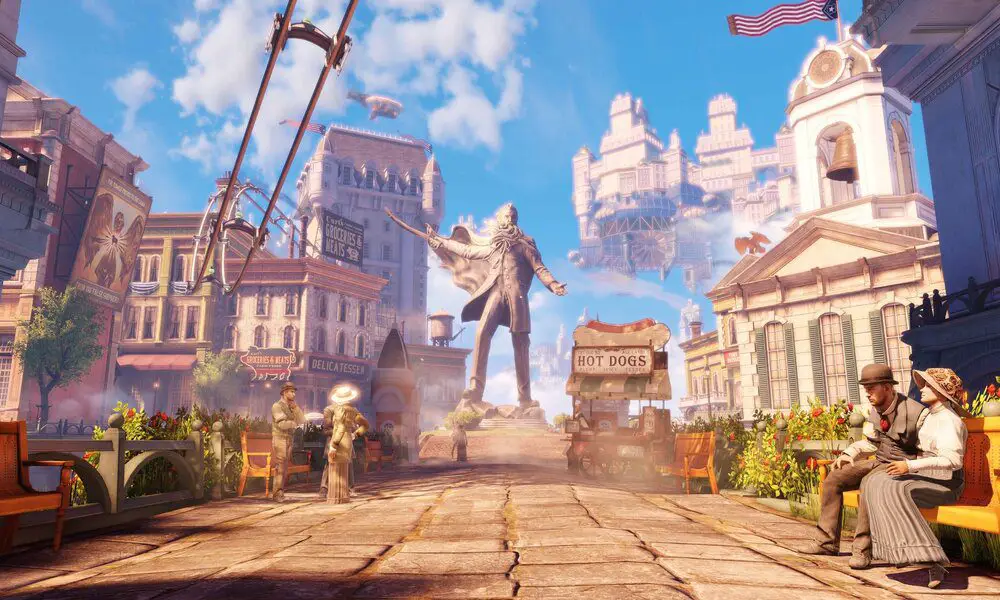
Warning! Spoilers ahead! If you’d like an opportunity to form your own opinion before you read mine, you can find your own copy of Bioshock: Infinite here.
Now, when I started the trilogy, of course I did so with the first game (and of course I loved it), but you may be surprised to learn I struggled with which game to play next. The thing is, I’d heard nothing about the second game, and it was, from the brief skimming of research that I pursued, considered something of a near-forgotten middle child. I was eager to dive into this seemingly critically acclaimed capstone of the series, having not yet had my fill after the series’ eye-opening first entry.
In the end, I quelled my impatience, and settled down, begrudgingly, to play the sequel, assuring myself that I was saving the best for last.
And I am so happy I did.
Bioshock 2 doesn’t quite have the same wondrous, chilling ambiance as its predecessor, but what it lacks in atmosphere it makes up for in charm. Its plot isn’t mind-blowing, but it has incredible twists and fleshed-out characters to more than make up for the difference. It takes the fact that there is an underwater city and reminds you that yes, it is a city. That means beyond the plasmid pissing contest between amoral entrepreneur Andrew Ryan and mobster Frank Fontaine, the city was full of people: immigrants and families and brilliant minds, caught up in the same power struggles and classism and racism that they fled the surface to escape from. We finally see the aftermath, witness the plight of a downtrodden people searching for answers and hope and desperately looking for it in the wrong places. And the DLC is absolutely amazing. If you’re also a latecomer to the franchise, or also decided to skip Bioshock 2, don’t. It’s worth every penny, I assure you.
Fresh off this unexpectedly mind-blowing ten hours or so, I finally, finally got to Bioshock: Infinite. This, I thought, will no doubt be one of the greatest gaming experiences I’ve ever had!
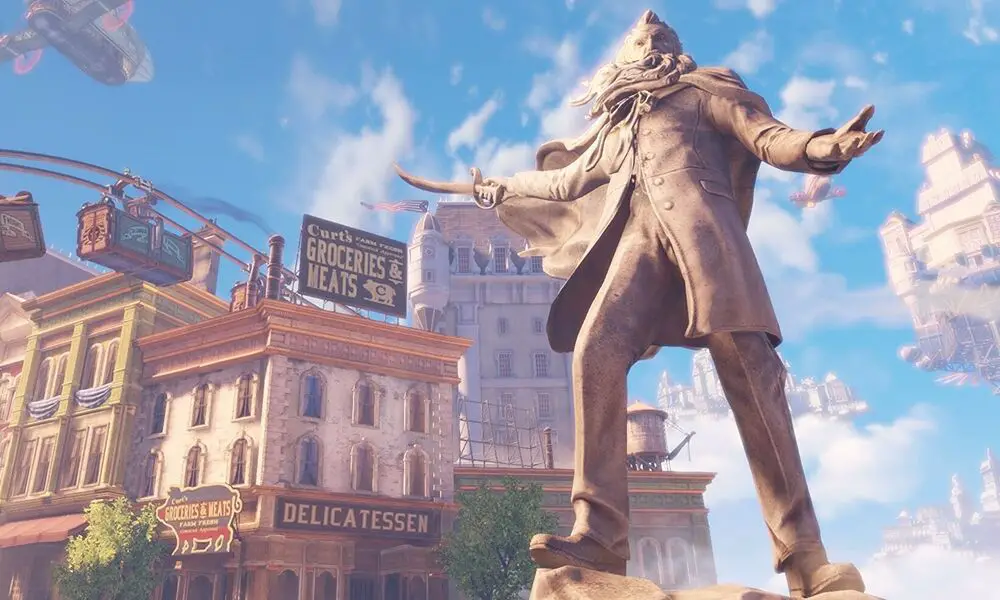
Oh, Boy
It wasn’t.
It really wasn’t.
There are a medley of, let’s say issues with the game, but let’s start with the easiest: game play.
I’m a simple person with a love for versatility and backups. I’m the person one bullet or potion away from becoming over-encumbered in a Bethesda game. I’m the person who spends as much time in the redial as I do shooting demons in Doom. My Mass Effect Shepard was Soldier class and they stayed Soldier class. I like my virtual weaponry, I like being over-prepared, and I like to have my pick.
So imagine my displeasure to go from being able to switch between three or four weapons in under a minute to being limited to two. Now, did I have fun with the Carbine or the Handcannon? Oh, no mistake. Did I almost exclusively use it and nothing else unless I was desperate? Also yes. The limited on-hand weapons wheel meant I found two niches and stubbornly held on to them for the better part of the entire game because the sheer overwhelming nature of the fire fights meant that scrambling to loot the corpse I’d just blown to bits and then trying to quickly figure out the new weapon’s benefits and drawbacks under a storm of gunfire happened far too often for me.
Speaking of which—the firefights. Cover in the game is abysmal. This isn’t like other Bioshock games where you set up traps and let your small army of hacked security bots, cameras, electric tripwires and mini turrets mop up the opposition while you sit pretty and smug with a chameleon perk. Infinite‘s enemies can overwhelm and flank your cover in moments (when you’re able to find sufficient cover). This is partially because the game really wants you to use its Skyhook system to traverse on overhanging wires and fire and attack NPCs from above.
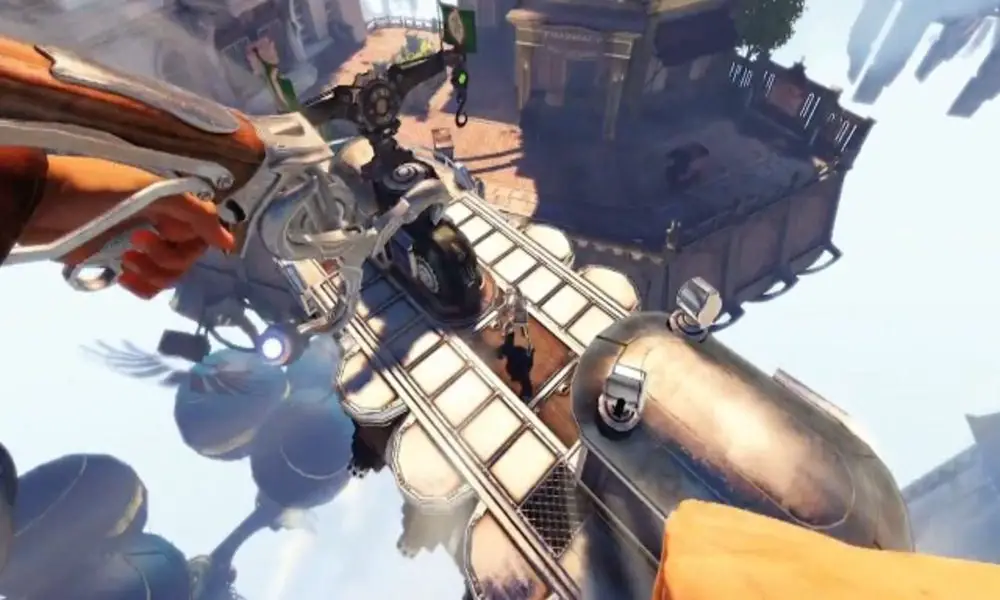
Now credit where it’s due: the Skyhook system can be really fun. It’s like a first-person POV on the rail and hook traversal system implemented in Sunset Overdrive. Once you get over the motion sickness, it’s quite enjoyable to leap from wire to wire and even knock enemies off on their own or leap onto their perches. There’s only two problems.
Firstly, aiming. Unlike the aforementioned Sunset Overdrive, whose over the shoulder view meant the weapon reticle was easily focused on the enemy with ample ability to flip and move in various directions without faltering in your aim, Infinite‘s first-person view means the camera has to be purposely angled to follow and aim at your enemy, while you’re accelerating past, over, or away from them. This means you either have to look up to redirect yourself back towards the person you’re trying to shoot, or else drop onto another, adjacent rail and attempt to reorient yourself back around, all the while being shot at.
Secondly, even basic enemies, especially as you get further in the game, eat up your ammo like crazy. Unless you’ve upgraded your weapon, even two or three headshots might not be sufficient. And upgrading your weapon is a bit of an exercise in futility, especially if you run out of ammo for your chosen weapon or, as what tended to happen far, far too often to me, Elizabeth decides to throw ammo for the inferior, non-upgraded weapon I’ve picked up in the heat of the moment.
In fact, let’s talk about Elizabeth. Actually, scratch that. We can’t talk about her until we talk about our protagonist, and this is where matters get difficult.
Let’s talk about Booker DeWitt.
Mr. Baker, We Need To Talk
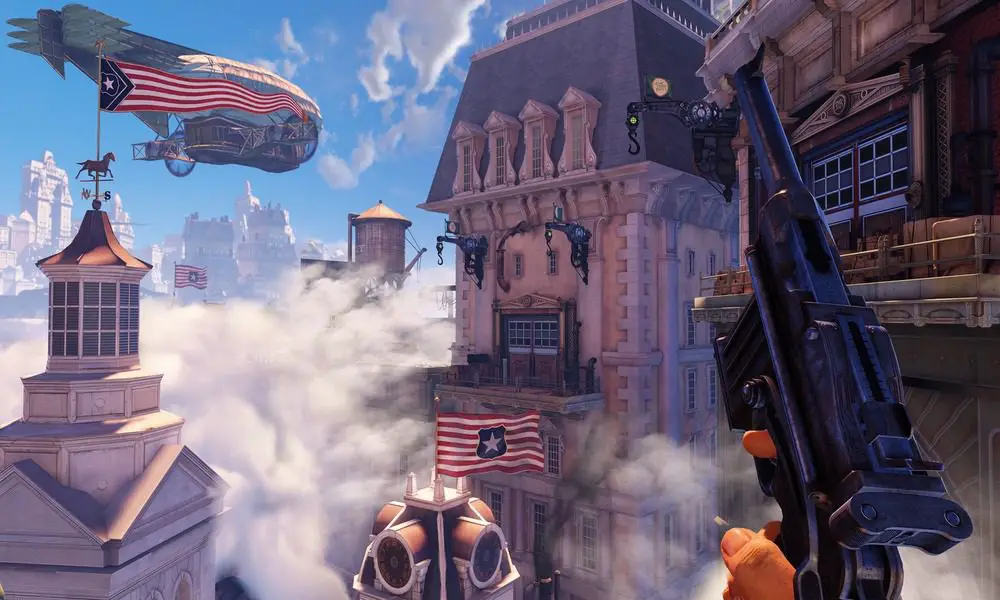
Booker is the first Bioshock protagonist to actually speak, and really, it was a step in the wrong direction.
Promotional media for Infinite and even in the game itself tries to paint Booker as a gruff, scruffy mercenary with a heart of gold. It’s an old, well worn portrayal that still very much works in modern media. Joel from The Last of Us series very much fits this image and we as an audience loved him for it. The difference between these men however can be boiled down to two points: when it comes to Booker, he’s not only boring, he’s just unlikable.
The Last of Us successfully avoided this pitfall by not only imbuing Joel with a tragic opening backstory, but making it clear from the get go that Joel very much had that soft spot and he was never going to be able to hide it for long. It was only a matter of when.
Booker is just an ass.
Okay, that’s harsh. But even his attempts to be kind are stunted and awkward and not in an endearing way. It feels like he’s playing by the numbers rather than having an organic experience. The connections being made are more so because the script demands he do so.
Not to mention that every “good” thing he does is purely mercenary. Granted that’s not always a bad thing. The unapologetic ally, pragmatic semi-sociopath is also a trope we love in media, after all. But Booker straddles that line and he does not do it well. He’s racked by guilt, of course, and he has his tragic backstory but his overall demeanor is just…there. After a certain point, he’s uninteresting in any role he tries to play or that you try to put him in–hero, villain, anti-hero, etc. He’s…he’s just there. I can’t bring myself to care about Booker’s eventual shot at redemption because I can’t bring myself to care about him. He’s the poster child for blandness.
And what’s worse is that this rubs off on Elizabeth.
Damsel Causing Distress
Pulling up those Last of Us Parallels, Elizabeth serves as the refined, bibliophilic Ellie to Booker’s discount Joel. She’s witty, curious, determined, and resilient, and serves as a much needed fresh breeze to Booker’s miasmic dourness.
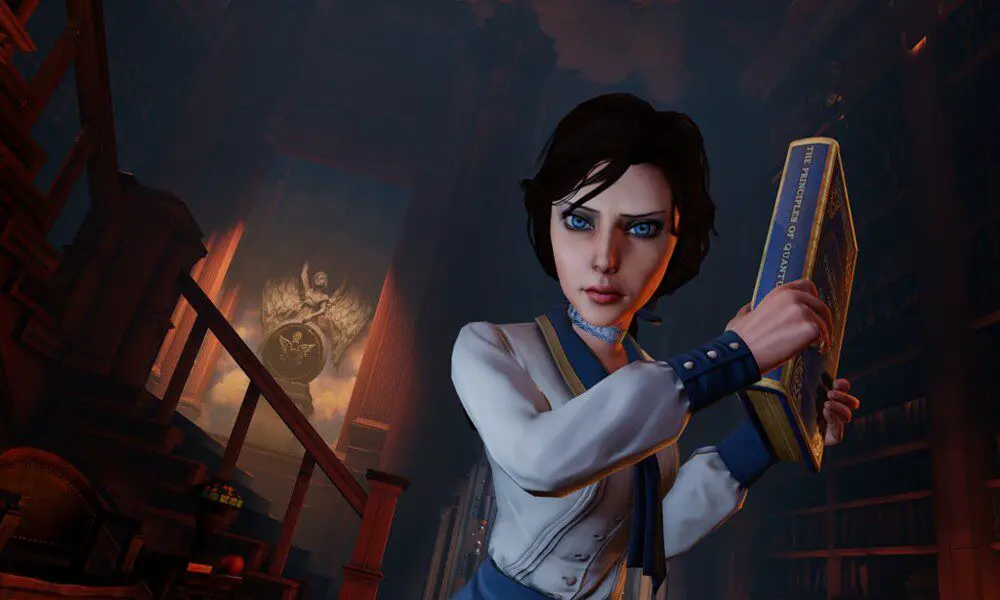
Initially.
See, Elizabeth, a sheltered idealistic dreamer, is broken out of her princess tower by Booker where she is confronted with the reality of the city of Columbia, the game’s setting. Namely, that it’s a festering pit of racism, discrimination, human rights violations, and poverty painted over by a thin veneer of 1920’s old town America. And she takes—understandable—exception to that but is very much not prepared to deal with the chaos that follows. Some time travel, murder, torture, and brainwashing later, Elizabeth comes out of it very much changed, and with a very clear sign as to whom her father is.
Now, no one expects Elizabeth to simply shake off her experiences, but the complete shift in bitter cynicism edged with ruthlessness is made all the more disconcerting when you add in Booker’s awkward and unconvincing attempts to be empathetic. Remember that period in the 2018 God of War where Atreus briefly became an arrogant sociopath? Extend that by another three hours and you have Elizabeth in the latter part of Infinite.
Of course she’s not the only sociopath. We can’t forget our third character (so to speak) in this game—the Vox Populi.
The Ultimate Flight Risks
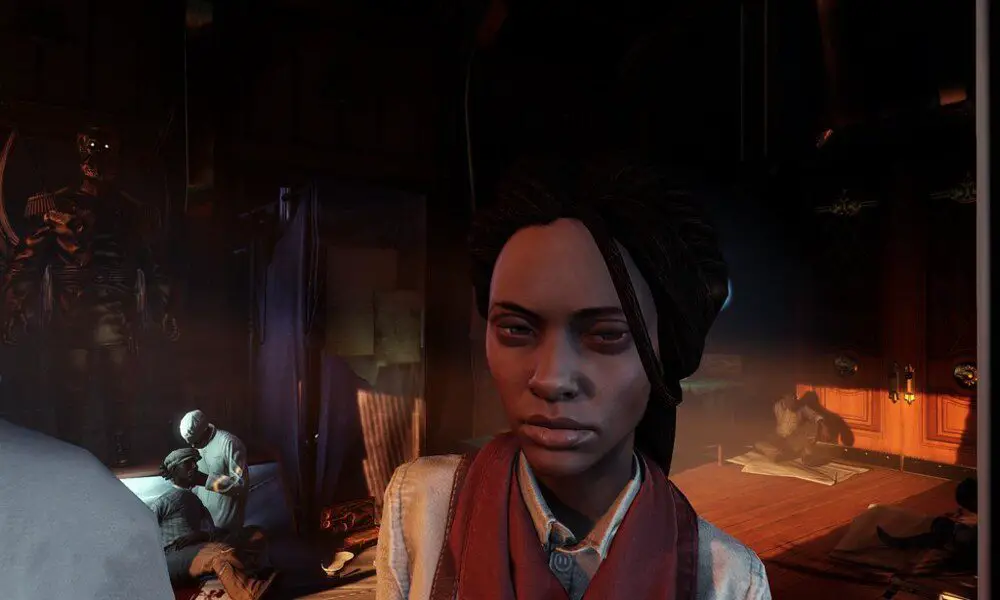
The Vox Populi are, in a word, controversial. The textbook rebellion of the downtrodden and oppressed, they’re a cause you want to throw yourself behind. In theory. Because by the latter half of the game, they’re made into a legion of gun-toting nutcases, and it’s…weird.
See, remember when I mentioned time travel? So originally, Booker and Elizabeth are blackmailed into aiding the Vox by their leader, Daisy Fitzroy—the Vox have numbers, but this is a world in which everyone has a firearm, be it made of steel or conjured via Salts. So, understandably, Fitzroy wants weaponry.
Except, through a series of shenanigans (and trauma), Elizabeth accidentally Tears open a rift through space and time to land the duo in an alternate timeline where Booker was not only a gunner but a martyr for the cause. And the Vox, now well armed and led by a bloodthirsty Fitzroy, are pretty much burning the floating city to the metaphorical ground.
This is a turn, I’ve found, that has caused a fair bit of discontent among players. Some dislike the rampant, brutal violence that occurs when the Vox take their vengeance. Others dislike the unflattering imagery of oppressed minorities being rendered into little more than gun-toting brutes—it is in many ways reminiscent of the American pro-slavery propaganda that claimed that African-Americans would bring destruction the moment they received a bit of power (read: equality).
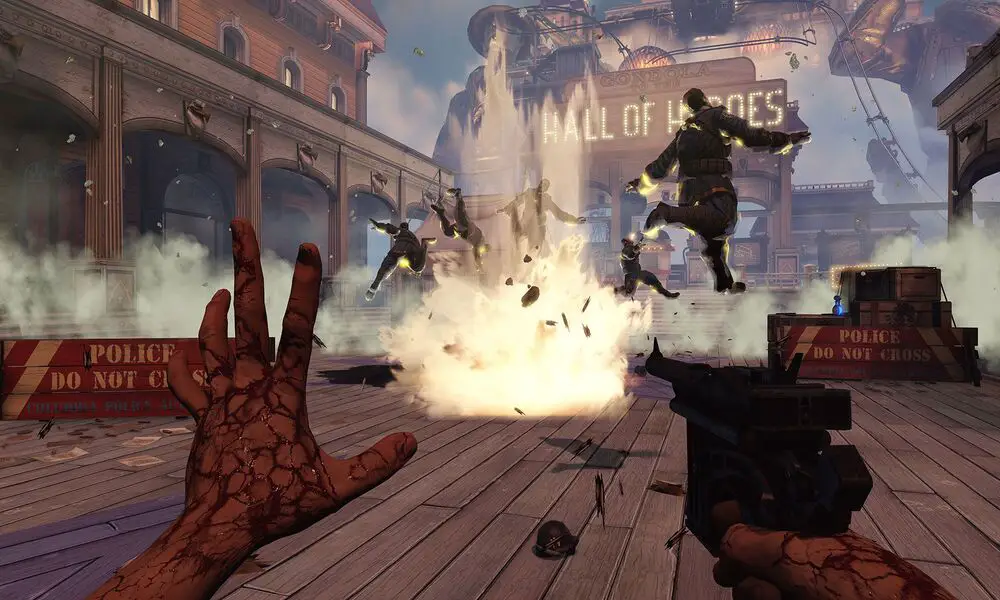
I’m of two minds. On one hand, I can see how this scenario came about. Daisy from the very beginning is pragmatic at the least and ruthless at the best. She’s smart, cares about her people, and fosters hatred from a lifetime of abuse and betrayal. There was never going to be a peaceful revolution here. On the other hand, I’ve mentioned before how much I dislike the limited nuance regarding civil rights movements in video games—that is, either making the people within those movements borderline Gandhi disciples or violent psychopaths. Infinite goes the route of the second, and while it’s not unexpected, it does feel a little bit more like the story is utilizing a bit of a heel turn to push its “there are no heroes” theme. It feels like the developers thought the very obvious villains in the racist, bigoted fanatics were somehow too mundane, and so threw in the Fitzroy curve-ball to try to shake things up.
That’s a perfect segway to delve into the game’s actual story because “It’s complicated” could have been slapped onto Infinite‘s cover, and I wouldn’t have raised an eyebrow. Because like so many other stories in which time travel is a vital aspect of it, things get confusing.
Once Upon a Time, This Story Put Me To Sleep
Booker Dewitt is sent to Columbia to seemingly kidnap a girl (Elizabeth) in order to wipe away his gambling debts. Ignoring our protagonist being an early 1900s human trafficker, Columbia turns out to be insane, scarred initials carved into his hand label him the antichrist, and Elizabeth has powers over space, time, and whatever the plot calls for.
Now, one of the consistent themes across the series is that of choice. Namely the concept of destiny. The first game proclaims it best; “No gods, no kings, only man”. To be sapient is to have free will and whether you’re a genetic experiment or a warped giant subject to horrid experimentation, you don’t have a destiny set out for you—you forge it yourself. One of the greatest expressions of this is the ability to choose, and it is a vital part of the game. Regardless of what others say, no matter how hard it is, you have the opportunity to do and be good even in underwater hell, and it matters.
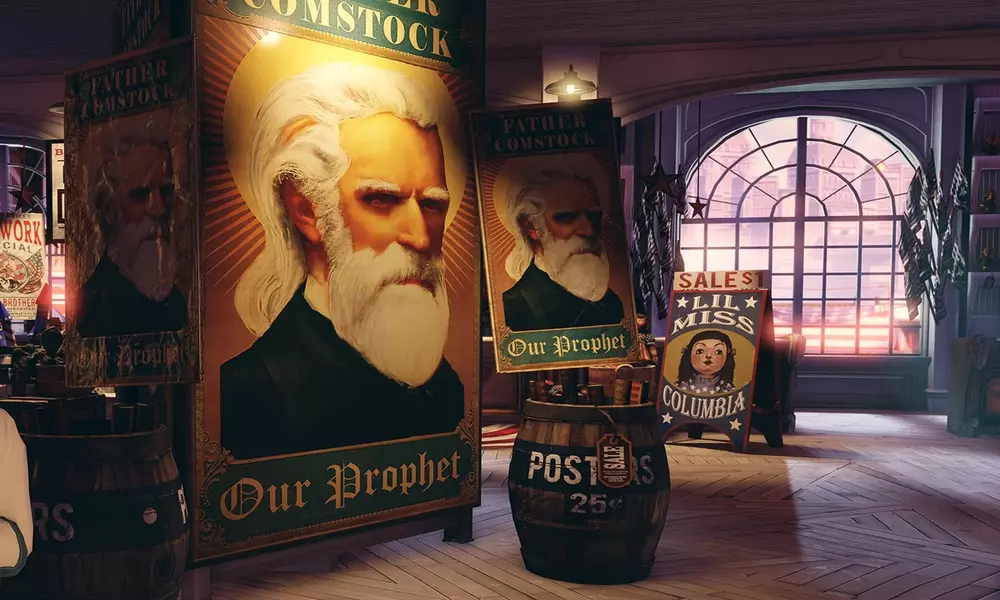
Infinite spits on that entire notion. Despite the game presenting you with several choices, none of them matter. Heads or tails? Doesn’t matter. Bird or cage pendant? Doesn’t matter. Throw a baseball at an imprisoned interracial couple? Doesn’t matter. Your choices do not affect the game in the slightest—all you have is the illusion of choice.
It’s annoying because it’s bad enough having a lackluster protagonist. It’s bad enough having a bungled villian in Fitzroy and a practically nonexistent one in the shadowy Zachary Comstock. But the fact that the pinnacle of the series’ themes is ignored entirely to try to present an edgy, take-it-or-leave-it style of narrative burns.
And then there’s Booker’s fate.
Here’s the thing: I loathe the “redemption is death” narrative we’ve exploited ever since Darth Vader threw the Emperor down a shaft. Dying to redeem is a copout we’ve cultivated in media because the only thing better to see than redemption is atonement and it’s hard. Redemption is what you do for yourself, atonement is what you do for others, and we rarely get to see the latter because unless you’re willing to devote four seasons to it like My Name is Earl did, often the only way it comes across as believable is when it’s a long and often messy process.
So my opinion of narrative goes down even further because the game concludes with Elizabeth and several of her inter-dimensional counterparts (you read that right) drowning you at the baptism that, in another universe, transformed the PTSD-riddled Booker into the bias-riddled prophet Comstock.
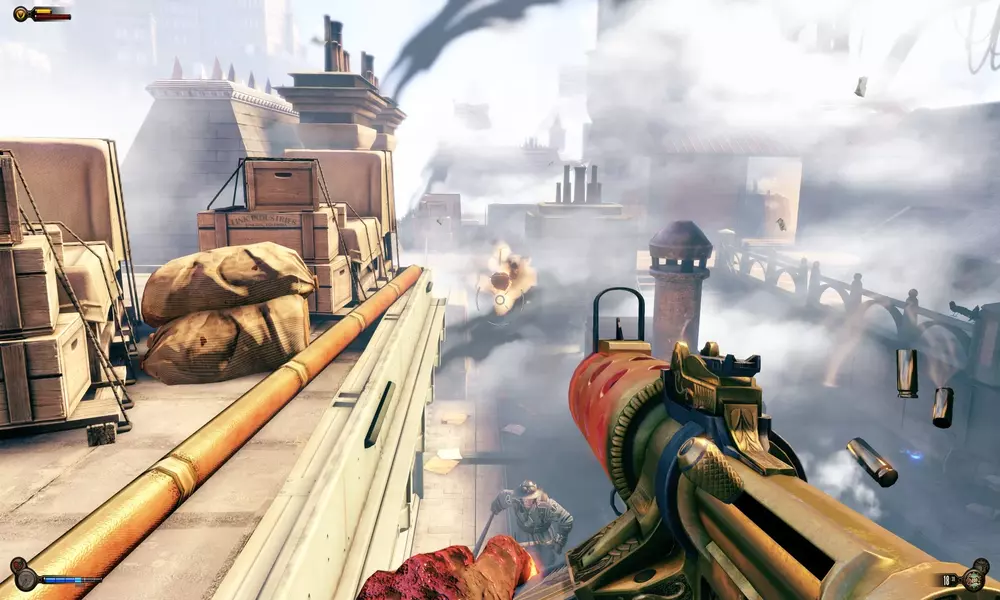
Don’t mistake my disgruntlement with actually caring about Booker. Rather, I’m upset because the story feels more like the writers became so enamored with the idea of shifting timelines and variables and dimensions that they forgot that technically, each of these characters in each of these situations is in fact a being with memories and agency. Even having played it a couple of times now, the game’s story feels cluttered, with several ideas about abuse and time travel and discrimination, only for each of these lines to fall flat, leaving the player feeling frustratingly dissatisfied.
It’s Not Better Down Where It’s Wetter
It’s not made any better by the DLC. I was lucky enough to avoid having to get it in two separate parts but Burial At Sea is…okay, it’s boring.
Now to be fair they bring back the city of Rapture and it’s incredible to see it before it’s fall to ruin, including a glimpse at fan favorites like the dramatic performer Sander Cohen, the unscrupulous scientist Yi Suchong, and the master manipulator himself Frank Fontaine, already wrapped in the identity of the once-mysterious Atlas. The city’s beautiful in its heyday, and we get to see the widening tears of overindulgence, corruption, and genetic modification that will soon rip the city apart.
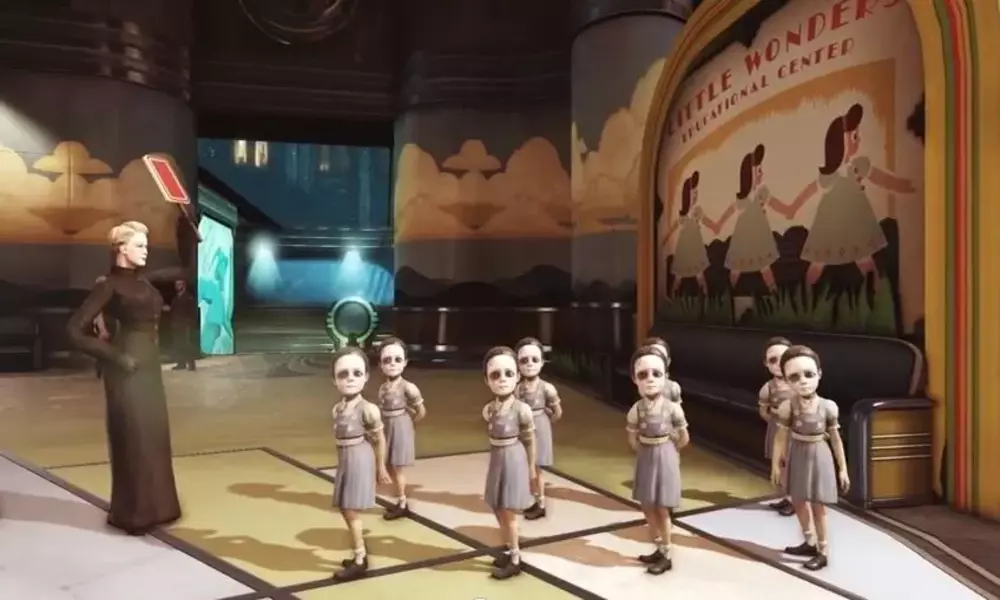
Unfortunately, we spend far too short a time in the splendor, and far too long in the murk. Much of the DLC in its entirety takes place in an abandoned section of Rapture. Part One is spent playing as a yet another amnesic Booker, a private eye who, yes, was also briefly an insane prophet but snapped out of it when he, just like in the main game, tried to have a baby Elizabeth, then named Anna, kidnapped from his past self. Only in this DLC timeline, the baby lost a lot more than a pinkie when the portal closed. Distraught, Comstock/Booker fled to Rapture, repressed his memories, and got them back just in time for Elizabeth to let him die via Big Daddy drill to the spine.
Part Two is through Elizabeth’s perspective, and her journey is very much a shoehorned, behind-the-scenes attempt to slide a prequel into a prequel. It would almost be fine if our new protagonist was (say it with me) interesting. Elizabeth’s power gets nixed because of…reasons, we’re made to believe that her minimal contribution somehow jumpstarted Fontaine’s entire plan from the first Bioshock and her murder, after everything she’s endured, is just insulting.
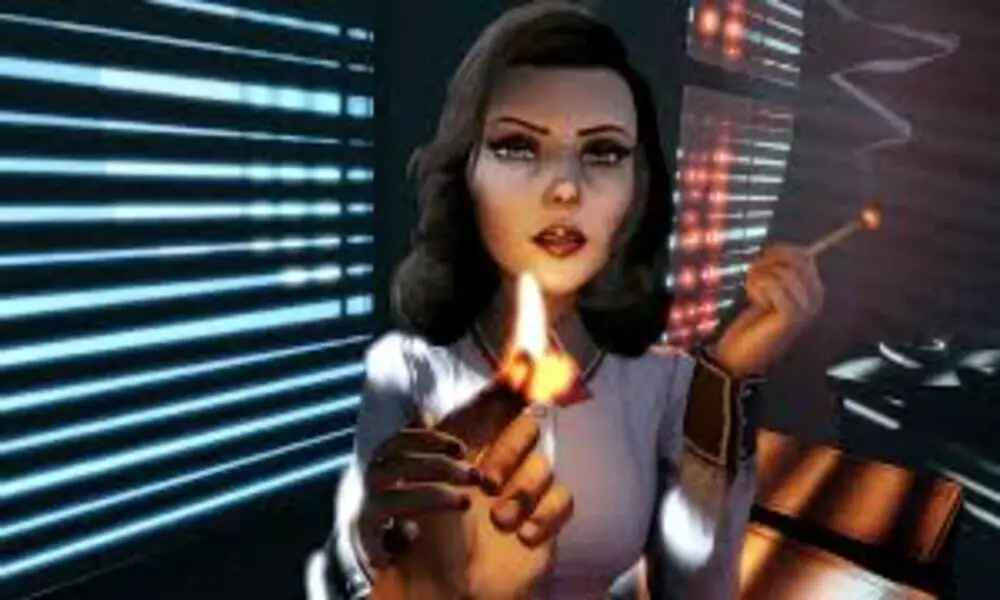
The entire DLC takes a character that had already left a bad taste in my mouth by the end of Infinite and made her even worse. She doesn’t have to be the Snow White she is when the game first begins, but in Burial At Sea she’s irritatingly condescending without much charm to back it up. The dimensional shenanigans left me grumpy and the fact that they once again simply do as the plot demands doesn’t make it better and her callous disregard of Booker’s death rubs the wrong way.
Even the nostalgia of being back in Rapture wears off quickly. It becomes very clear that the same ambience that captivated players in the first two games is muted in the series’ third. By the first hour, I didn’t feel immersed—I felt cajoled. See? It’s Rapture! Don’t you like Rapture?
To put the whole experience in perspective, I lost track of how many times I played the Minerva’s Den DLC from Bioshock 2. Here, I know exactly how many times I played Burial At Sea: exactly as many times as I needed to and not a moment more. Minerva’s Den was a delight—Burial At Sea was a chore.
The Final Impact
So ten years later, what’s the verdict on Bioshock: Infinite? Masterpiece or mess?
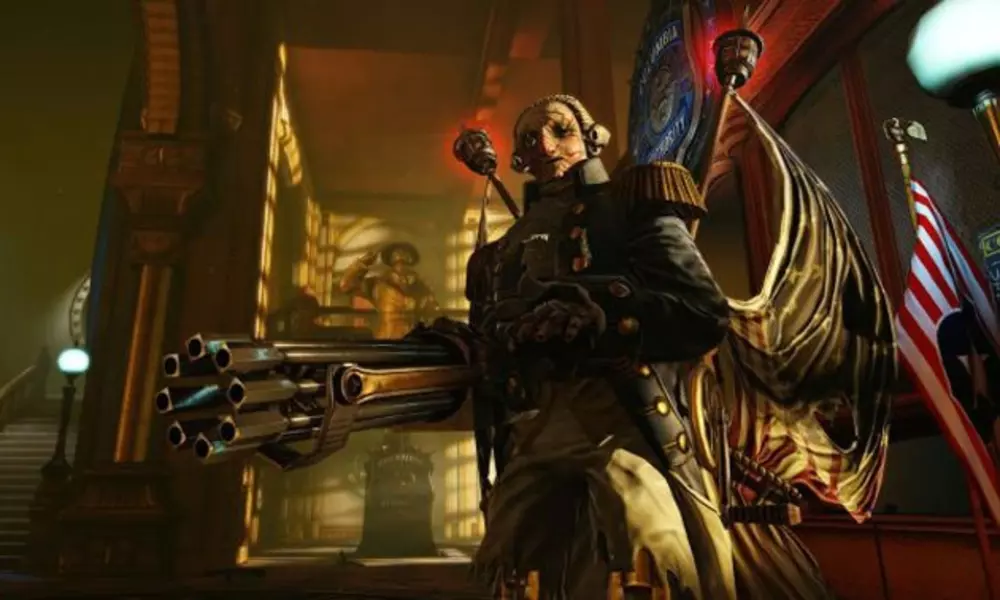
Well, despite the fact that I’ve spent the better part of this piece lambasting the game, it’s not terrible. It reeks of experimentalism, and whether you like the outcome or not, trying new avenues is always a worthwhile endeavor. Infinite stretches itself thin in several directions, but that it stretches at all is worthy of respect.
At its core, Bioshock: Infinite wasn’t a bad game. It just wasn’t a good Bioshock game. By itself it may have been better, but it was attached to a series with a lot of weight and cultural influence and it just didn’t meet that benchmark.
That being said, Bioshock: Infinite, for all of its hype and pitfalls, did succeed in one thing: getting me to play (and love) its predecessors over and over again.
Images courtesy of Irrational Games
Have strong thoughts about this piece you need to share? Or maybe there’s something else on your mind you’re wanting to talk about with fellow Fandomentals? Head on over to our Community server to join in the conversation!

